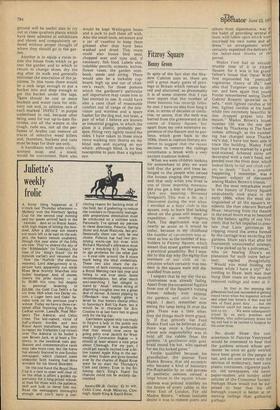Fitzroy Square
Benny Green
In spite of the fact that the Sha dow Cabinet says so, there are still a great many gates of privi lege in Britain which remain bar red and shuttered, so presumably it is of some interest that I can now report that the number of these bastions has recently fallen by one. I have no idea how long it was, in terms of decades or centu ries, or aeons, that the mob was barred from the greensward at the centre of Fitzroy Square. but apart from my own extensive experience of the Square and its pur lieus, which goes back to the 1930s, there is copious literary evidence to suggest that the recent decision to remove the railings constitutes a break with a very ancient tradition indeed.
When we were children looking for somewhere to play we were told that the grass and trees belonged to the people who owned the houses ringing the greenery, and that only when you lived in one of those imposing mansions did you get a key to the garden. (Are you listening. Reverend Dodgson?) This was a lie. as I discovered during the war when I enrolled at a boys' club in the. square, only to learn that larking about on the grass still meant an expedition to nearby Regents Park. The deprivation was not nearly as acute as it would be today, because in my childhood the number of car-owners was almost as low as the number of keyholders to Fitzroy Square, which meant that street games were still a practical possibility. But I wonder to this day why the eighty-five members of our club, an institution which certainly was resident in the square were still disqualified from entry. I suspect that by my day the exclusiveness was already fading. Apart from the occasional fugitive from one of the Square's nursing homes, nobody ever entered the gardens. and once the war oegan, I don't remember ever seeing the lamp being lit over the gate. There was a time when they did things much more grandly. If that princely liar Ford Madox Ford can be believed at all, there was once a functionary whose sole responsibility was to hold off the rabble from the gardens. "A gentleman with gold braid round his hat, who opened for me the locked gates."
Fordie qualified because his grandfather, the painter Ford Madox Brown, that old eccentric who became a kind of honorary Pre-Raphaelite by an odd process of aesthetic osmosis owned a large house in the square. whose address was printed indelibly on the brains of every cabby in the West End of London. For old Madox Brown, "whose laudable desire it was to redeem poets and
others from dipsomania, was ill the habit of providing several ol them with labels upon which were inscribed his own name and a. d dress," an arrangement whict certainly expedited the delivery 0 the better-read drunks of tho period.
Madox Ford had an enviabl; erudite time of it in Fitzro Square, for it was in his grand father's house that Oscar Wild first expounded his "poetically vegetarian theory of life," her
also that Turgenev came to dinner, and here again that young
Fordie remembered seeing Dante Gabriel Rossetti sprawled on a sofa, " with lighted candles at his feet, lighted candles at his heat
while two extremely beautiful ladies dropped grapes into his
mouth." Madox Brown's house, number 120, was the one described by Thackeray in The New comes, comes, although, as the number
ing ing has changed since Thacki ray's day, I have not been able to trace the building. Madox Ford says that it was marked by a great soot-stained, lichened stone urn decorated with a ram's head, sus pended over the front door, which looked likely to fall and crush call
ers to death: " Such a possible happening, I remember, was a frequent subject of discussion among Madox Brown's friends."
But the most remarkable event in the history of Fitzroy Square undoubtedly took place in the early 1890s, when the most distinguished of all the square's residents, the then obscure Bernard Shaw, returning from the theatre in the small hours was so besotted by the balletic agility of one centi, that he felt impelled to emulate that Latin gentleman by tripping round the arena formed by the carriage-way encircling the gardens. Shaw says that after his fourteenth unsuccessful attempt, "I was picked up by a policeman," who on hearing Shaw's explanation for such outre behav
iour, replied thoughtfully, "Would you mind holding my helmet while I have a try?" According to Shaw, both men then hung their coats on the recently removed railings and went at it
. . . by four in the morning the .p-Oliceman had just succeeded in getting round twice when his inspector arrived and asked him bitterly if that was his idea of fixed point duty . . . but the inspector could not resist the temptation to try. . . . We were subsequently joined by an early postman and milkman, who unfortunately broke I is leg and had to be carried to hospital by the other three.
No doubt Shaw the conscientious St Pancras Vestryman would be interested to hear that
per
imeter gardens around whose .
imeter he once so gaily swirled, have been given to the people at last, and are now strewn with the detritus of mobocracy, beer cans, plastic containers, cigarette pac kets, old newspapers, old ne‘ spaper-readers and sundry other articles of the Consumer Society. Perhaps Shaw would not be surprised to hear that his old borough council is better at removing railings than gathering garbage.


































 Previous page
Previous page